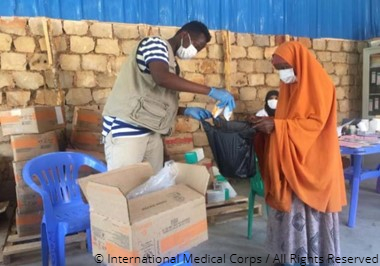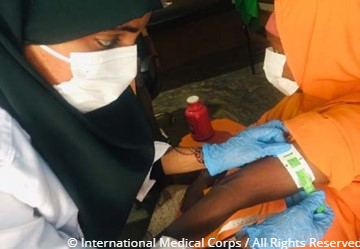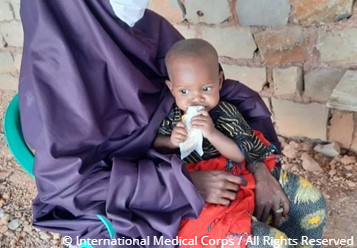
Good news from Somalia. Our local partner International Medical Corps Somalia has started and is continuing the distribution of the life-saving nutritional aid that arrived to Mogadishu in September. 1,495 cartons of Ready-to-Use Supplementary Food (RUSF) were shipped to the country with critical support from Edesia and MOAS.
The distribution started in October, and between then and December 2020, 163 cartons of RUSF were given out to 649 beneficiaries (484 children and 165 PLWs).
Nurses and assistant nurses distributed the supplies to the registered beneficiaries (children 6-59 months with MAM and acutely malnourished PLWs) on a bi-weekly basis. Each beneficiary received 14 RUSF sachets (bi-weekly), or one sachet per day, per beneficiary.
The team is continuously admitting beneficiaries, especially children aged between 6-59 months with MAM (Moderate Acute Malnutrition). However, COVID-19 has affected the admission criteria, as IMC has adopted the Mid-Upper Arm Circumference (MUAC) as the only criteria into Integrated Management of Acute Malnutrition (IMAM) programs due to the no-touch policy associated with COVID-19. The Mid-Upper Arm Circumference (MUAC) is the circumference of the left upper arm, measured at the mid-point between the tip of the shoulder and the tip of the elbow (olecranon process and the acromium) and is used for the assessment of nutritional status.

SOMALIA, A CRITICAL SITUATION
In 2020, an estimated 5.9 million people needed humanitarian assistance in Somalia, as a result of decades of drought, flooding, displacement, poverty, and ongoing conflicts, which have left millions of Somalis dependent on outside support for their survival and livelihood. Moreover, the COVID-19 outbreak has impacted the country as a result of movement restrictions, which have reduced the humanitarian capacity in support of the most vulnerable communities.

Food security remains a major concern especially in northern and central areas of the country where pastoral community livestock has been so depleted by prolonged drought that residents have little left to sell for food. The widespread ramifications of the pandemic add to these challenges. Forced displacement following conflict and natural hazards have left thousands of people with significant food, shelter and WASH needs.
The high levels of acute malnutrition are due to the triple threat that Somalia is facing with desert locusts, flooding and the socioeconomic impacts of COVID-19, in addition to the cumulative impacts of previous shocks. Despite modest improvements in recent years, malnutrition rates in Somalia remain among the highest in the world, and ongoing insecurity in the country—particularly in areas that lack established local authorities and where al-Shabaab is present—contributes to the complex emergency.
According to results from 37 separate nutrition surveys conducted by the Food Security and Nutrition Analysis Unit (FSNAU) – Somalia, “in early to mid-2021, the acutely food insecure population is likely to rise over 2.5 million due to the impact of consecutive, below-average rainfall seasons on crop and livestock production. Sustained humanitarian food assistance is required to prevent Crisis (IPC Phase 3) or worse outcomes and protect livelihoods”.
Currently one in seven Somali children under 5 are already acutely malnourished, and the situation is deteriorating quickly. Urgent nutrition support and treatment are required for 849,900 children under the age of five years who will likely face acute malnutrition through August 2021, including 143,400 who are likely to be severely acutely malnourished. MOAS is on the side of the International Medical Corps in trying to provide integrated interventions to support recovery and prevent the deterioration of the nutritional situation.
If you are interested in the work of MOAS and our partners, please follow us on social media, sign up to our newsletter and share our content. You can also reach out to us any time via [email protected]. If you want to support our operations, please give what you can at www.moas.eu/donate.
